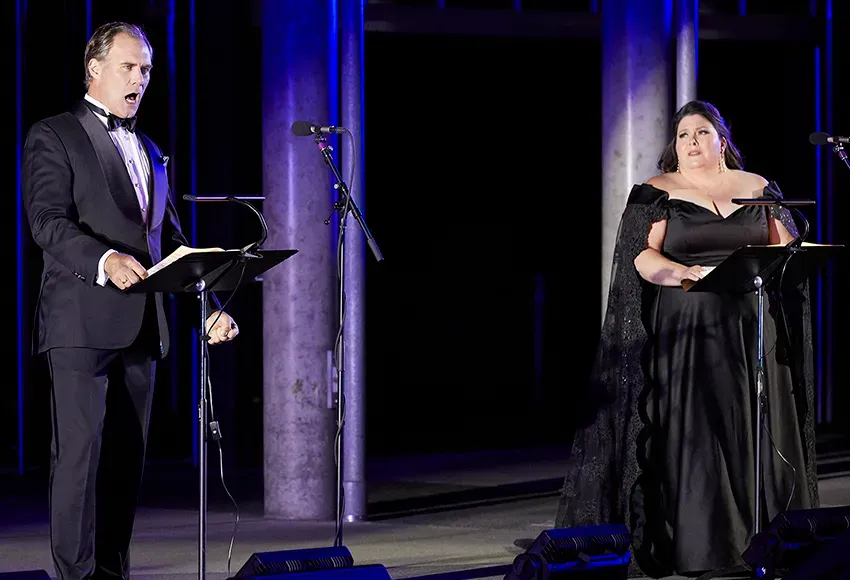DIE WALKÜRE
BY RICHARD WAGNER (ABRIDGED BY SEATTLE OPERA)
FISHER PAVILION, SEATTLE CENTER
AUGUST 28
During the year and a half since the onset of the pandemic, Seattle Opera has done a remarkable job of creating productions designed to be filmed, with plenty of physical distance between singers. Under the leadership of General Director Christina Scheppelmann, the company managed to produce digital versions of all operas planned for the 2020–21 season. The two most recent of those productions (Flight, filmed primarily in the Museum of Flight, and Tosca, filmed at St. James Cathedral) were particularly vivid and satisfying to experience at home.
However, this week's Welcome Back Concert – an abridged, amplified, minimally staged Die Walküre performed outdoors at Seattle Center – reminded opera lovers of what we've been missing: the joy of live performance. The audience was masked, distractions abounded, and essential parts of the drama were cut.
But damn, it felt good to be part of an opera audience again.
The atmosphere was festive and celebratory, with many audience members wearing paper winged hats to represent the Valkyries or colorful T-shirts acquired at past productions of Wagner's Ring Cycle. Although people were not crowded together, Fisher Plaza looked and felt full. Before the concert, parents pushed strollers, family groups shared the contents of picnic baskets, and a rooftop beer garden added to the merriment.
The concert itself was the best possible, considering the difficult circumstances. Ludovic Morlot, conducting a Wagner opera for the first time, led Seattle Symphony musicians in an orchestral performance of rare clarity and expressiveness. The rich texture of Wagner's music was all there, but the sound was never muddy. The wind rattled the microphones and fuzzed the music at times, but Morlot and these excellent musicians cannot be held responsible for that.
Opera singers normally sing without microphones; in fact, their voices sound best when unamplified. One of the thrills of attending an opera performance is the experience of receiving a singer's voice directly into one's ears, unmediated. Of course that was impossible at Fisher Plaza, but the singers stood several feet back from the microphones, and top-notch sound designed by Robertson Witmer made for a decent outcome.
The main characters of Die Walküre are Brünnhilde and her father, Wotan, but cuts (admittedly necessary for the concert format) decreased their roles and showcased instead Siegmund and Sieglinde, the long-separated twins who fall in love in Act I. The most exciting, beautiful vocal performances were also those of tenor Brandon Jovanovich as Siegmund and soprano Angela Meade as Sieglinde. Eric Owens is one of the best bass-baritones around, but he sounded slightly underpowered as Wotan (possibly the fault of the microphone). Soprano Alexandra LoBianco has excelled at Seattle Opera in recent years as Aïda and Tosca, and her voice in concert was lovely, but to my ears, she didn't sound like Brünnhilde the Valkyrie; some vocal heft was missing. As Sieglinde's villainous husband Hunding, bass Raymond Aceto sang well but lacked a menacing edge.
Stage director Dan Wallace Miller did a fine job but is capable of much more than a concert setting permits. Connie Yun's highly effective lighting provided most of the visual interest.
Wagner's glorious score survived the competition of porta-potty doors banging, gulls screeching, and helicopters whirring. In fact, a few of the distracting sights and sounds actually enhanced the show; for example, at one point, the lit-up Space Needle elevators ascended in synchrony with the Valhalla theme. Unfortunately, the helicopter noise was badly timed, coinciding with the love duets in Act I rather than the Ride of the Valkyries in Act III.
In an attempt to make up for the substantial cuts, summaries of plot points were occasionally displayed on the large screens beside the stage. The witty summaries made many audience members laugh and, alas, broke the mood of several serious scenes.
One thing that I learned from the cuts was that the missing parts are absolutely essential to the drama. Without the Act II scenes between Wotan and Brünnhilde and between Wotan and his wife Fricka, we have no sense of Wotan's dejection or of his close relationship with Brünnhilde, so the heartbreaking "Wotan's Farewell" scene falls flat. On the other hand, including the missing material would have meant a four-hour performance with no action, no sets, no costumes, no English supertitles. That would have been a long evening indeed.
Despite these quibbles, I left the concert feeling elated and hopeful, and looking forward to the upcoming season of live performances at McCaw Hall. The first production of the 2021–22 season, La Bohème, opens on October 16. Hurrah!
For more information, go to https://www.seattleopera.org/


